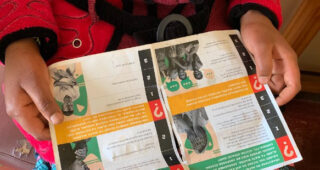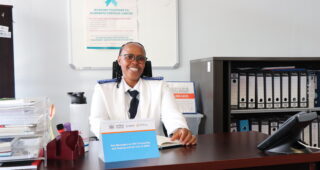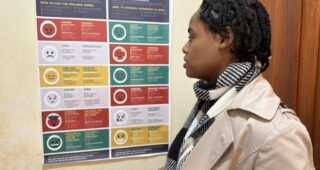Full of Hope in Zimbabwe
Mary is a bright-eyed 6-year-old living in Ngundu, a small town in southern Zimbabwe. Her mother, Varaidzo, is a widow who does her best to provide for Mary and her older son, Peter, through subsistence farming. Varaidzo and Mary are both living with HIV, a situation that would have been dire a generation ago. But both are getting the medical and psychosocial support they need through the Ngundu Health Center, a Ministry of Health and Child Care facility, which is supported by the Elizabeth Glaser Pediatric AIDS Foundation (EGPAF) and other partners.
Mary represents a growing AIDS-free generation in sub-Saharan Africa—boys and girls who will live long and healthy lives despite having a mother who is living with HIV.
In 2011, when Varaidzo was pregnant with Mary, the Zimbabwe Ministry of Health and Child Care set a goal to dramatically decrease the rate of mother-to-child infections, expanding prevention of mother-to-child HIV transmission services. Unfortunately, Varaidzo was not reached in time, and she only discovered her HIV-positive status after Mary was born—when she went to the clinic to treat her own persistent illnesses. She was tested for HIV and learned that she is HIV-positive.
Varaidzo’s husband tested positive for HIV as well. When he learned his status, he left the family and refused to take medication. Eventually, he died from AIDS-related causes.

“I started taking ARVs [antiretroviral medication] when Mary was 3 months old,” says Varaidzo. Mary was also tested and diagnosed with HIV. “She started on ARVs, and we both adhere religiously to our treatment. If it were not for our medicine, Mary might be dead right now.”
“My life is much improved. I am happy, and my child is healthy,” Varaidzo continues, “On Saturdays we come to the support group meetings held here, and I learn which foods to give my child so that she can be healthy—and so that I, too, can have a healthy and productive life.”

“Because I am a widow, I struggle to provide my children with everything that they want, but I make sure that Mary gets her medicine and that she at least has sadza [cornmeal porridge] and vegetables to eat.”
During my support meetings we also learn how to disclose their HIV status to our children slowly over time. And we learn to love our HIV-positive children unconditionally—to treat them like other children so that they do not feel stigma from living with HIV.
Eighteen years ago, one-quarter of the adults in Zimbabwe were HIV-positive and 2,000 adults and children were dying each year from HIV-related illnesses. But today, testing and treatment is available across Zimbabwe, and more than 75 percent of people living with HIV are adhering to lifesaving antiretroviral medication.
Varaidzo looks down and smiles at Mary, who is intensely drawing letters on a health pamphlet. “My child likes writing,” Varaidzo says. “She is very intelligent. As we are progressing with our lives, I make sure that Mary goes to school. It is my dream that she will go overseas one day and be a great person.”

“I appreciate the support that we get from the health center. They make sure that we have the pills that we need to stay alive. They teach us about how to maintain good health. Then we go back home and implement what they teach us.”
“I just pray that God gives me more years on earth so that I can raise my child. Thanks to the Ministry of Health and EGPAF, I have hope for our future.”
The Elizabeth Glaser Pediatric AIDS Foundation’s work at Ngundu and 59 other sites across Zimbabwe focuses on supporting children and adolescents living with HIV by linking them to care and treatment, providing enhanced adherence counseling and other peer-led psychosocial support.
Zimbabwe
Adolescent Identification, Care & Treatment; Pediatric HIV Diagnosis, Care & Treatment



